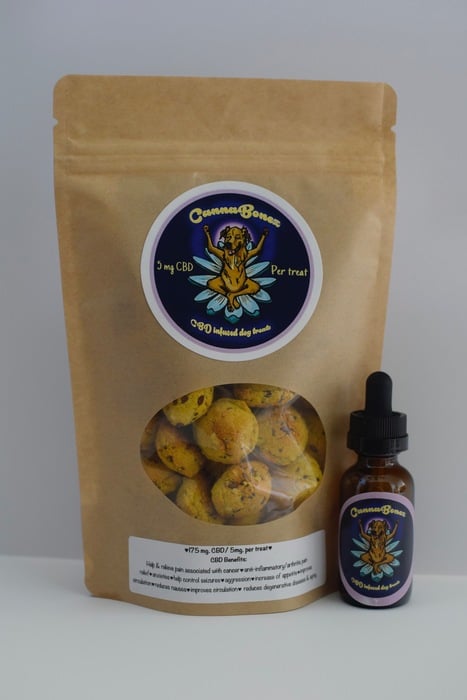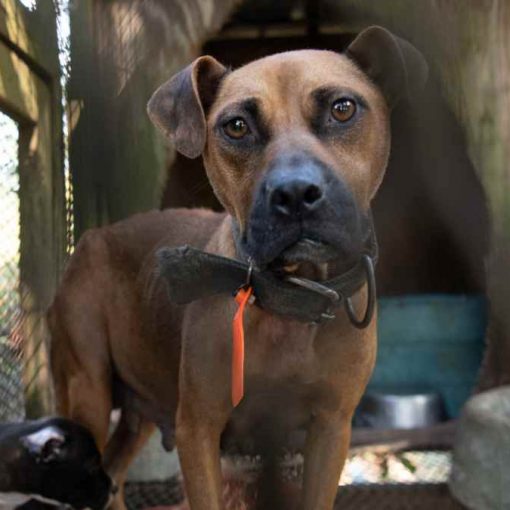More and more people are turning to marijuana-related products for their pets. Is that a good thing?
By Helen Ravenel Hammond
Let’s get honest here. If your beloved pet had a serious illness or even a terminal disease, you would most likely do whatever it is in your power to make him/ her more comfortable- whether it be through clinical trials or trying the latest drug.
Take Eloise, for example. The eight-year-old English Bulldog had all the conditions an aging bulldog naturally gets- double hip dysplasia, knee problems, bilateral alopecia, hypothyroidism, dry eye, etc. She was on all kinds of medications, barely walking, not eating well, and her stomach was always upset from the medications.
Melissa Goodmon’s veterinarian recommended she try Cannabis oil (CBD), a liquid derived from the marijuana plant. Unlike THC, the high-inducing molecule in marijuana, CBD is not psychoactive. After much research, Goodmon found a marijuana dispensary (she lives in California, one of 29 states with laws broadly legalizing marijuana in some form). With her medical cannabis card, she started Eloise on her regimen.
Since then, Eloise has been off all “western meds.” That was more than a year ago.
“We’d already added acupuncture and a Raw diet. Her hair has grown back, she can walk up and down the stairs, go on short walks, has her energy and appetite back. Honestly, it’s been awesome,” says Goodmon.
Dr. Kellie Horton of Sun Dog Cat Moon Veterinary Clinic on Johns Island, says she has found cannabis to be extremely beneficial in patients with inflammatory issues. She has used it for pets with allergies, arthritis, neurological conditions, sometimes anxiety, even heart disease, depending on the type of cannabis and the milligrams.
“If I can, I will use the powder formula (dehydrated powder) or in the form of treats versus the oils,” she says, explaining that the oils have caused pancreatitis or GI issues with some patients.
“Ganja-preneurs”
These were the exact sentiments for Folly Beach residents and “Canna Bonez” founders Matt Mummert and Stacey Detlor.
When Stacey’s dog, Roscoe couldn’t get up and down the steps, they began giving him homemade CBD-infused treats last April. The “old man” became spry again — able to run, eat and play with other dogs. Canna Bonez came to fruition.
According to Matt, they have had a lot of positive feedback.
“People have been taking a more holistic approach for themselves and their furry friends, and CBD is as holistic as it gets! People are seeing all the benefits that CBD has to offer as hemp is becoming more culturally accepted.” Hemp is a sister plant to marijuana. While the plants are related, a person cannot get “high” on hemp because of its lack of THC. Hemp is legal in South Carolina.
Speaking of hemp, Dolittle’s in Charleston carries True Hemp chews and Releaf Hemp Oil. At an organic grocery store, Charleston resident, Holly Hadley recently discovered Pet Releaf Hemp Health Edibites. Her 12-year-old Sheltie/Lab mix, Reesie, had severe spondylosis from neck to tail and was prescribed multiple medications (Gabapentin, Methocarbamol, and Tramadol) to help treat her arthritis and chronic pain for years. When Reesie was diagnosed with the aggressive cancer, hemangiosarcoma, and given weeks to live, Hadley wanted to make sure that Reesie was as comfortable as possible.
“The Edibites seemed to help her with her overall mobility and ability to get comfortable with decreased restlessness. No negative effects were noted,” she said, commenting that she is glad to have added something to enhance her quality of life those last few months.
Self Medicating?
Jamye Hurteau wanted to see if the rage for hemp oil was all true. She started putting a touch of the oil on her 17-year-old Boykin’s gums. She thinks it’s prolonged his life in a positive way.
“There’s no set dosage for us with this oil for pets, so I’ve really been ‘medicating’ him, so to speak on my own,” says Hurteau.
This has been the complaint all along for those wary to administer or to try these CBD products. These products are not FDA-approved, and there has been no FDA evaluation of how they could interact with other drugs, or whether they have dangerous side effects or other safety concerns, according to the FDA website.
That’s why many veterinarians are squeamish to recommend or even talk about cannabis options.
Dr. Suzy Shannon, owner of Sweetgrass Animal Hospital, says, “The anecdotal evidence is promising for these substances, but it is difficult to recommend them because controlled studies have not yet been done. You cannot ask a dog or cat if they are experiencing side effects. Although our pets have human qualities, they have a different way of metabolizing substances; so we, as veterinarians, rely on studies to come up with a safe dose.”
Veterinarians’ reluctance doesn’t discourage people like Hurteau, “I know Snapper’s days are numbered. I would do whatever I could do to help him and what better way than something plant based and 100% natural?”
But even as the evidence that cannabis products could help your pets, experts say it’s always important to consult your veterinarian for an opinion. They know your pet’s health challenges better than anyone.





